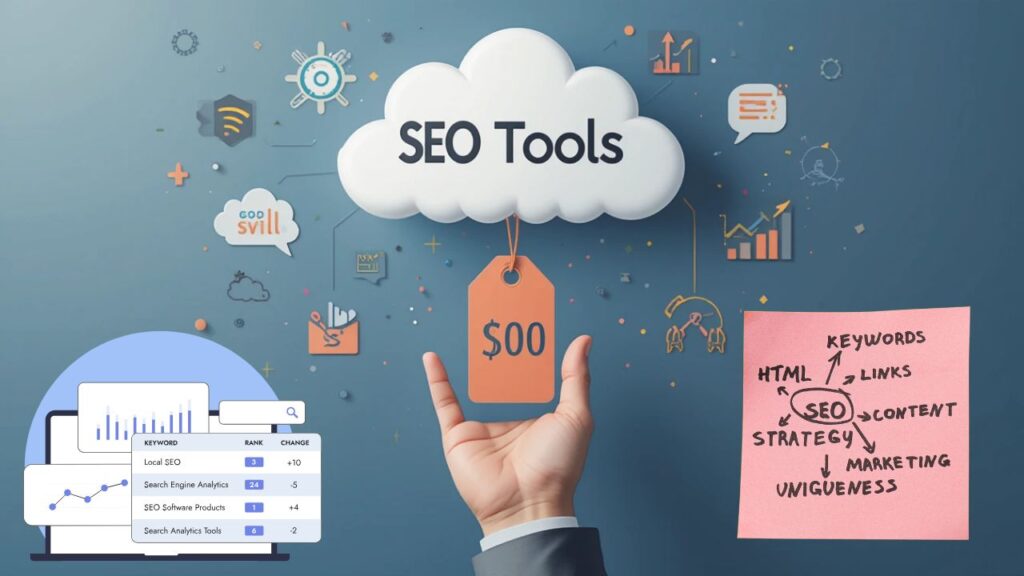Understanding the Costs of SEO Tools: What to Expect
How much does SEO tools cost? When you enter the world of SEO, one of the first questions you might have is about the costs associated with SEO tools. Understanding these costs is crucial for making informed decisions that align with your budget and your marketing goals. SEO tools can vary significantly in price, with options available for every budget. So, let’s dive into the different types of SEO tools available and what you can expect to pay for them.

Types of SEO Tools
SEO tools can be broadly categorized into several types. Here’s a quick rundown:
- Keyword Research Tools: These help you find the right keywords to target.
- Site Audit Tools: These analyze your website’s health and performance.
- Link Building Tools: These assist in finding and managing backlinks.
- Rank Tracking Tools: These monitor your rankings over time across different search engines.
- Content Optimization Tools: These guide you in optimizing your content for SEO.
Price Ranges of SEO Tools
Now let’s take a closer look at the estimated costs for these tools. The pricing can change based on features, user limits, and subscription models. Here’s a breakdown:
| Type of Tool | Average Monthly Cost | Typical Features |
|---|---|---|
| Keyword Research Tools | $20 – $100 | Keyword suggestions, search volume, difficulty score |
| Site Audit Tools | $50 – $300 | Health checks, issue reporting, recommendations |
| Link Building Tools | $30 – $150 | Backlink analysis, competitor insights, outreach management |
| Rank Tracking Tools | $10 – $100 | Position tracking, SERP analysis, mobile ranking |
| Content Optimization Tools | $30 – $250 | Content scoring, keyword suggestions, readability scores |
Factors Influencing SEO Tool Costs
Understanding the factors that influence SEO tool costs can be beneficial. Here are some key elements:
- Features: The more features a tool offers, the higher the cost. Basic tools may suffice for small businesses, while larger enterprises may opt for more comprehensive functionalities.
- Subscription Model: Some tools require annual payments, while others offer monthly subscriptions. Annual subscriptions often come with discounts.
- User Limits: Many tools price their plans based on the number of users. If you plan to have multiple team members access the tool, choose a plan that accommodates your needs.
- Customer Support: Tools that offer dedicated support or training sessions may charge higher fees because they provide additional value.
Free vs. Paid Tools
If you’re new to SEO, you might wonder whether to start with free tools or jump directly into paid options. Here’s a quick comparison:
- Free Tools:
- Pros: No cost, good for beginners, helps in basic tasks.
- Cons: Limited features, less advanced analyses, may not be scalable.
- Paid Tools:
- Pros: Comprehensive features, constant updates, superior analysis.
- Cons: Costly, especially for small businesses just starting.
Maximizing Value from SEO Tools
To get the most value from your SEO tools, consider the following tips:
- Choose wisely: Ensure the tool fits your specific needs rather than opting for the most popular one.
- Utilize free trials: Many companies offer free trials, which allow you to test features before committing financially.
- Integrate tools: Use multiple tools together to cover all aspects of your SEO strategy effectively.
By identifying the right tools and understanding their costs, you can make smart investments in your SEO strategy. This understanding will help you to enhance your online visibility and ultimately, drive more traffic to your site.
The Value of Investing in SEO Tools for Your Business
How much does SEO tools cost? Investing in SEO tools is essential for businesses looking to enhance their online presence and drive traffic to their websites. These tools help identify opportunities, monitor competitors, and optimize content for better search engine visibility. Let’s take a closer look at the major benefits and the types of SEO tools available in the market.
Understanding the Different Types of SEO Tools
There are several categories of SEO tools that you can explore. Each type serves a unique purpose, catering to different aspects of your SEO strategy. Here are some common categories:
- Keyword Research Tools: These tools help you discover relevant keywords that potential customers are searching for. Popular options include Ahrefs, SEMrush, and Google Keyword Planner.
- On-Page SEO Tools: On-page tools assist in optimizing individual pages to rank higher. Tools like Yoast SEO and Moz Pro are excellent for checking title tags, meta descriptions, and overall content quality.
- Link Building Tools: Building quality backlinks is crucial for SEO success. Tools like Majestic and BuzzSumo allow you to analyze your link profile and explore opportunities for acquiring new links.
- Technical SEO Tools: These tools examine your website’s performance, structure, and technical issues. Google Search Console and Screaming Frog are renowned for identifying and troubleshooting technical problems.
- Analytics Tools: To measure the success of your SEO efforts, analytics tools provide insights into website traffic and user behavior. Google Analytics is a widely-used tool in this category.
Why Investing in SEO Tools is Worth It
How much does SEO tools cost? Investing in the right SEO tools comes with several advantages. Understanding these benefits can help you see the value of your investment:
- Enhanced Visibility: SEO tools help you identify and target the right keywords to attract your target audience, thus improving your website’s visibility in search results.
- Improved Strategy: With insights from SEO tools, you can formulate a more effective digital marketing strategy. Analyzing competitor performance allows you to identify gaps and tap into unexplored opportunities.
- Time Efficiency: Automating aspects of your SEO efforts saves time, allowing you to focus on producing quality content and improving engagement.
- Performance Measurement: You can track your website’s SEO performance effectively, helping you adjust your strategies based on measurable insights.
Cost of SEO Tools: Assessing Your Options
The cost of SEO tools can vary widely based on the features offered, so it’s essential to find options that fit your budget and needs. Here’s a rough breakdown of what you might expect to spend:
| Tool Type | Price Range |
|---|---|
| Keyword Research Tools | $20 – $200/month |
| On-Page SEO Tools | $10 – $100/month |
| Link Building Tools | $50 – $300/month |
| Technical SEO Tools | $20 – $150/month |
| Analytics Tools | Free – $500/month |
These prices vary based on functionalities and the scale of your business. Many tools offer free trials, allowing you to test their features before committing a budget.
Choosing the Right Tool for Your Business
With so many options available, how do you choose the right SEO tool for your business? Here are some factors to consider:
- Your Goals: Determine what you want to achieve with SEO. Are you looking for increased website traffic, content optimization, or link building? This clarity will guide your choice.
- Budget: Establish a budget range that your business can afford. Remember, some tools may require a higher investment but provide wider functionality.
- User-Friendliness: Make sure to choose a tool that is user-friendly. A simplified interface helps you leverage the tool effectively without a steep learning curve.
- Quality of Customer Support: Reliable customer support can be very beneficial, especially when you’re facing issues or need assistance with features.
How much does SEO tools cost? Investing in SEO tools is vital for developing an effective digital marketing strategy. Each tool serves a unique function in improving your website’s performance, and understanding the costs and available options can help you make a sound investment that drives business growth.
Comparing Pricing Models: Monthly vs. Annual Subscriptions
When considering which SEO tools to invest in, one key factor stands out: the pricing model. Many tools offer either a monthly or annual subscription plan. Understanding the differences between these two options can help you make a more informed decision that aligns with your budget and needs.
How much does SEO tools cost? Monthly subscriptions typically require a smaller upfront investment, making them attractive for businesses that want to test a tool without a long-term commitment. This option is ideal if your situation can change rapidly or if you want to explore different tools without being locked in. On the other hand, an annual subscription often comes with a significant discount, thereby reducing the overall cost. This is a better choice for businesses that have long-term SEO strategies in place and can anticipate their needs over a year.
Comparing Costs
Here’s a breakdown of the costs you may encounter when weighing monthly vs. annual subscriptions:
| Subscription Type | Average Monthly Cost | Annual Cost with Discount | Average Savings |
|---|---|---|---|
| Monthly | $50 | N/A | N/A |
| Annual | $42 | $500 | $100 (Savings: 20%) |
In this example, while a monthly subscription may seem manageable at $50, committing to an annual plan reduces your average monthly cost to $42, leading to significant savings over time. This is a critical aspect to consider when looking at tools like SEMrush, Ahrefs, or Moz.
Flexibility vs. Commitment
Monthly subscriptions offer flexibility. If you find your needs changing or if a tool is not delivering the expected results, you can cancel or switch plans without significant financial implications. This is particularly beneficial for freelancers or small businesses whose budgets may fluctuate. However, keep in mind that if you frequently cycle through monthly subscriptions, you may end up spending more in the long run compared to committing to an annual plan.
Annual subscriptions, conversely, embody a commitment. Businesses that choose this path need to be certain about their choice. It’s a decision that involves a larger upfront payment, but it can pay off, especially if you’re dealing with seasonal trends or long-term campaigns. With an annual subscription, you often receive extra perks, like priority customer support or exclusive features, which can enhance your overall experience with the tool.
Usage Patterns
Your usage patterns also play a significant role in determining which payment model is right for you. If your SEO efforts vary significantly month-to-month, a monthly subscription could allow you to scale your tools up or down as needed. For instance:
- You might only need comprehensive tools during peak seasons, such as product launches or marketing campaigns.
- For ongoing tasks like keyword tracking, a monthly option allows for regular reassessment of tool effectiveness.
How much does SEO tools cost? Annual subscriptions suit businesses with consistent SEO needs. It’s ideal for those who maintain a steady pace of content updates, link building, and performance monitoring. Committing to an annual plan can pave the way for deeper insights, as you are likely to use the tools more consistently and make the most of your investment.
Additional Considerations
When deciding between subscription models, consider the following:
- Trial Periods: Some tools offer trial periods. Take advantage of these to assess whether the tool meets your requirements before committing.
- Refund Policies: Check if the provider has a refund policy for annual subscriptions. Some may offer a refund within a limited time if you find the service does not meet your expectations.
- Team Size: Consider how many users will need access. Some services provide discounts for multi-user licenses with annual plans.
Your decision should ideally match your business goals, budget, and usage patterns. By weighing the pros and cons of monthly versus annual subscriptions, you can make a choice that not only saves you money but also supports your overall SEO strategy.
Free vs. Paid SEO Tools: Which Is Right for You?
How much does SEO tools cost? When you’re looking to improve your website’s visibility, SEO tools are essential. With many options out there, deciding between free and paid SEO tools can be a challenge. Each type comes with its own set of features, benefits, and limitations. Understanding these aspects can help you make an informed decision based on your specific needs.

Free SEO tools are appealing because they come without any price tag. However, it’s important to recognize the restrictions they may possess. Common free tools can include:
- Google Analytics: Offers insight into website traffic and user behavior.
- Google Search Console: Helps monitor website performance in search results.
- Ubersuggest: Provides keyword suggestions and site audits.
- Answer the Public: Generates keyword ideas based on popular questions.
How much does SEO tools cost? While these free tools can provide basic support for your SEO strategy, they have limitations. Most do not offer in-depth analysis or comprehensive data. This may hinder your ability to fully understand the effectiveness of your SEO efforts. For example, tracking advanced metrics like conversion rates or social media analytics is often missing in free versions.
Now, let’s consider paid SEO tools which come with a variety of advanced features. Some well-known paid options include:
- Ahrefs: Offers comprehensive backlink analysis, keyword research, and website audits.
- SEMrush: Provides in-depth competitor analysis, advertising insights, and SEO content tools.
- Moz Pro: Features a user-friendly interface with robust keyword tracking and site analysis.
- Serpstat: Combines features like keyword research, site audits, and competitive analysis.
Paid tools typically deliver more powerful functionality that helps you achieve better results. They often offer:
- In-depth Insights: Get detailed reports regarding keyword rankings, backlinks, and site health.
- Advanced Features: Utilize tools like site audits, rank tracking, and market analysis.
- Customer Support: Enjoy dedicated customer service to help answer questions or troubleshoot issues.
However, keep in mind that the costs can add up. Most paid tools operate on a subscription model with monthly fees ranging anywhere from $20 to $500 or more, depending on the features you choose. Here’s a general breakdown of what you might expect for each tier:
| Tool | Basic Plan | Standard Plan | Premium Plan |
|---|---|---|---|
| Ahrefs | $99/month | $179/month | $399/month |
| SEMrush | $119.95/month | $229.95/month | $449.95/month |
| Moz Pro | $99/month | $179/month | $249/month |
| Serpstat | $69/month | $149/month | $249/month |
Choosing between free and paid SEO tools often depends on your budget and the complexity of your SEO needs. If you’re just starting out or have a small website with minimal competition, free tools may suffice. They can give you a basic understanding of your site’s performance and allow you to conduct preliminary keyword research.
How much does SEO tools cost? On the other hand, if you’re serious about scaling your SEO efforts, a paid tool may be a worthwhile investment. The in-depth data and enhanced analytic capabilities can provide a clearer path toward improving your site’s performance and meeting your business goals.
Ultimately, consider combining both free and paid tools. Start with free options to understand your baseline performance, then explore paid tools as your business grows. This hybrid approach can maximize your resources while offering keen insights into how to enhance your website’s visibility.
Whichever path you choose, the goal remains the same: to enhance your online presence. Make thoughtful choices based on your needs, and you’ll surely find the right tools to help your site succeed.
Hidden Costs of SEO Tools: What You Need to Know
When delving into the world of SEO tools, it’s essential to understand not just the initial costs, but also the hidden costs that can significantly impact your budget. Pricing for SEO tools can range from free options to premium subscriptions that might seem reasonable at first glance. However, many of these tools come with unexpected fees and expenses that can catch you off guard. Let’s explore these hidden costs to keep you well-prepared.
First, consider the membership fees. Most reputable SEO tools have tiered pricing structures. For instance, an entry-level package may appear affordable, but unlocking advanced features often requires upgrading to a more expensive plan. What initially seems like a small investment can balloon when you need access to those essential features. Always check what’s included in each tier and how it aligns with your specific needs.
How much does SEO tools cost? Another key aspect is the user limit. Many SEO tools charge based on the number of users or seats. If you work in a team, you may find that there are added costs for every additional user. For companies with multiple departments needing access, these costs can accumulate quickly. Understanding the pricing model will help you forecast your total investment more accurately.
Furthermore, you may encounter charges for add-on features. Some tools have basic packages that do not include everything you might require, such as comprehensive reporting, competitor analysis, or proprietary data. These extra features often come with separate price tags, which can lead to surprise expenses when you realize what you need is not included in your initial purchase.
You will also want to factor in training and onboarding costs. While some tools offer user-friendly interfaces, others may require additional learning to maximize their potential. If your team lacks expertise, you might consider investing in courses or seminars to fully utilize the tool’s capabilities. This is another layer of expense not always clearly outlined when considering the base cost of SEO tools.
Don’t forget about updates and ongoing maintenance. Some SEO tools, particularly those that provide technical SEO audits, may charge for periodic updates to their software. Additionally, there can be costs associated with keeping your data up to date, as you might need regular consultations or additional features for ongoing analysis.
How much does SEO tools cost? It’s also important to keep in mind the cost of related software or services. SEO tools often work best in conjunction with other marketing tools, like social media management systems or content creation platforms. If you need to pay for multiple subscriptions to get the full benefit of your SEO tool, it can quickly add up, leading to a higher overall cost.
Additionally, if you are considering hiring external consultants or agencies to assist with your SEO strategy, this could lead to significant costs. Many businesses overlook this necessary aspect, focusing solely on the tools. An effective SEO strategy often encompasses more than just the tools themselves—it involves professional insight and guidance, which can further strain your budget.
Be aware of cancellation fees or policies. If you decide to switch tools or providers, some companies impose fees or restrictions on data export. Understanding these policies upfront can help you avoid unexpected charges if you ever need to transition away from a specific tool.
While SEO tools serve as a critical investment in your digital marketing strategy, the associated hidden costs deserve careful consideration. Below is a summary list to help you visualize these potential expenses:
- Membership fees based on tiered pricing
- Charges for additional users
- Fees for add-on features not included in basic packages
- Costs for training and onboarding sessions
- Updates and ongoing maintenance fees
- Expenses related to complementary software and services
- Consulting or agency fees for additional expertise
- Cancellation fees or data export restrictions

Understanding these hidden costs empowers you to make informed decisions when selecting SEO tools. This thorough approach not only enhances your budget management but also maximizes the effectiveness of your investment in SEO tools, ultimately driving better results for your online presence.
Key Takeaway:
When considering how much SEO tools cost, it’s essential to take a comprehensive view of both the financial investments and the value they bring to your business. The costs associated with SEO tools can vary widely, so understanding what to expect will help you make informed decisions. Often, businesses find that investing in quality SEO tools can significantly enhance their online visibility, ultimately resulting in increased traffic and sales. Thus, the price tag attached to these tools should be viewed as an investment rather than just an expense.
One key aspect to consider is the comparison of pricing models. Monthly subscriptions can provide flexibility, allowing businesses to assess their immediate needs without a long-term commitment. On the other hand, annual subscriptions typically offer a cost-effective solution. Many tools provide discounts for yearly plans, making them attractive for those who know they will be using these tools long-term.
Equally important is the consideration between free and paid SEO tools. Free tools can be beneficial for small businesses or startups with limited budgets. However, they often come with limitations in terms of features and data. Paid tools, while costing more upfront, usually provide a richer experience, with comprehensive data analysis and ongoing support that can yield better results.
Hidden costs associated with SEO tools also warrant attention. Sometimes users overlook expenses related to training, integration with other tools, or the need for advanced features, which can all contribute to the overall cost. It’s crucial to factor in these additional costs when budgeting for SEO tools.
Investing in SEO tools is fundamental for businesses looking to enhance their online presence. Weighing the costs and benefits, as well as understanding the different pricing models and potential hidden costs, will result in smarter, more effective spending that pays dividends in the long run.
Conclusion
Navigating the world of SEO tools can be a game-changer for your business, especially when you grasp the various costs involved. Expect to find a range of prices, reflecting the quality and functionalities of the tools. Investing in effective SEO tools is not merely a transaction; it’s a strategic move that can provide significant returns by increasing your site’s traffic and visibility.
When deciding between monthly and annual subscriptions, consider your budget and the specific needs of your business. While monthly plans offer flexibility, annual subscriptions often come with cost-saving benefits that can enhance your overall ROI. It’s essential to weigh these options carefully in light of your long-term goals.
How much does SEO tools cost? The debate of free versus paid tools is ongoing. While free tools can serve as a great starting point, they often lack the depth of features and support that paid options provide. Assessing your unique requirements will help determine which category suits you best.
Moreover, be mindful of the hidden costs that can arise when using SEO tools. These can include the time spent learning to use the tools, potential software upgrades, and add-on services that might not be included in the base pricing. Awareness of these expenses will prepare you for effective budgeting.
Ultimately, finding the right SEO tool is about more than just initial costs. It involves a thoughtful assessment of how these tools align with your business objectives, drive results, and ultimately help you thrive in the competitive digital landscape. By prioritizing your needs and weighing all aspects, you can make informed decisions that contribute to your success.
FAQ
Is SEO tools free?
SEO tools can vary in cost. Some are free, offering basic features, while others come with subscription fees for advanced functionalities. Free tools include Google Analytics and Keyword Planner, while premium tools like Ahrefs and SEMrush offer comprehensive insights for a price. Choose based on your needs and budget.
Why is SEO so expensive?
SEO can be expensive due to the expertise required, time investment, and ongoing nature of the work. High-quality SEO involves in-depth keyword research, content creation, technical optimization, and link building. Professional agencies and tools also contribute to the cost, ensuring sustained and effective results for higher rankings.
Are SEO tools worth it?
SEO tools are worth it as they provide valuable insights, streamline processes, and enhance website performance. They help with keyword research, competitor analysis, and tracking metrics. Investing in SEO tools can save time, improve rankings, and drive organic traffic, making them a smart choice for digital marketing success.
Is SEO a one time cost?
SEO is not a one-time cost. Effective SEO requires ongoing efforts to maintain and improve rankings. Continuous keyword research, content updates, technical optimizations, and monitoring are essential to adapt to changing search engine algorithms and competition, ensuring sustained online visibility and traffic growth.
Which SEO tool is best?
The best SEO tool depends on your needs, but Ahrefs, SEMrush, and Moz are top contenders. Ahrefs excels in backlink analysis, SEMrush offers robust keyword research, and Moz provides comprehensive site audits. Each tool has unique strengths, so choose based on your specific SEO goals and requirements.

